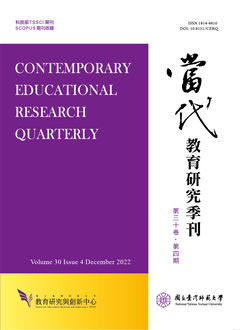

研究目的
臺灣從 1990 年代教育改革運動一直到 108 新課綱素養的各項革新,師資培育一直是教育發展上的一大難題,更遑論多元文化師資培育。鑒於體制內的改變有其結構性限制,本研究因此從體制外的非營利組織「為台灣而教」(Teach For Taiwan, TFT)著手,描繪計畫的願景為「回應教育不平等」的 TFT 如何透過教師培育計畫促進教育平等的過程與策略,從甄選條件、教師專業發展系統等層面,透過與多元文化教育的對話開始,探究未來多元文化師資培育的可能圖像,文中也討論到 TFT 對「教育不平等」的指涉內涵與其實踐方式的關聯性。
研究設計/方法/取徑
臺灣教育學界近二十年來有關「教育不平等」相關論述逐漸被
包裹在「多元文化教育」範疇,因此本研究透過深度訪談、參與觀察、文件分析等質性研究方法,嘗試勾勒出 TFT 師資培育計畫的圖像輪廓,並與多元文化教育理論概念進行對話,以進一步深探 TFT 所面臨的挑戰對於未來臺灣多元文化師資培育可能的提醒。
研究發現或結論
本研究發現有四:(一)TFT 重視未來師資的軟實力,將教師視為領導者的訓練,並運用跨領域的督導制度由外圍鷹架出多層次支持體系,過程中著重溝通、問題察覺、自我覺察、換位思考等,可為未來多元文化師資培育制度性設置的參考;(二)TFT 回應的「教育不平等」主要聚焦於經濟面向之「階級」意涵,而多元文化教育範疇中的偏鄉、原住民族文化等,大多成為服務環境脈絡而已,且「教育不平等」回應之內涵甚少觸及性別不平等議題;(三)TFT以申請者個人的「核心能力特質」作為主要甄選條件使得招募到的教師群體「多樣卻同質」,可能落入「自由的多元文化主義」的困境;(四)此外,TFT 成員對於多元文化教育的理解,多數抱持「多元的多元文化主義」—看見差異、尊重差異,但較少進一步挑戰主流社會文化結構;然而真實場域的學習使得 TFT 成員能夠逐漸跨越原本「經濟中心」階級指涉的「教育不平等」概念,「反思」的過程也能讓教師開展其對「多元文化教育」更結構性的觀看。
研究原創性/價值
臺灣有關另類師資培育組織的研究很少,「為台灣而教」(TFT)的研究更有其標誌性的意義,此為第一個深入瞭解 TFT 師資培育計畫的研究,可供其他師資培育機構與團隊作為發展多元文化教育師資培育的參考。
教育政策建議或實務意涵
TFT 的教師專業發展系統提供的個人督導制度與同儕支持網絡運作方式,可供師培課程或制度建置的參考。然而,如何更全面的回應「教育不平等」,而非特定概念指涉,也是未來多元文化師資培育努力的方向。
Purpose
Teacher training has always been a major problem in Taiwan’s educational development from the 1990s educational reform movements to the recent various competency innovations in the “108 Curriculum Guidelines,” not to mention the training of multicultural educators. Given the structural limitations of transforming the mainstream education system in Taiwan, this study uses the example of a non-profit organization, “Teach For Taiwan” (TFT), to illustrate the strategies and practices of TFT for promoting educational equity through its teacher training program in responding to educational inequity. This study explores the future imaginary of multicultural teacher training through the dimensions of recruitment criteria and teacher professional development mechanisms in TFT. The primary purpose is to create a reflective space for dialogues between multicultural education and TFT’s connotation and practices to improve educational inequity.
Design/methodology/approach
Scholarly discourses regarding “educational inequity” have been gradually immersed in the area of multicultural education in the past two decades. Against this context, this study uses a qualitative methodology, including in-depth interviews, participatory observation, and documentary analysis, to depict a clearer image of TFT’s teacher training program. We engage in dialogue with theoretical concepts of multicultural education to further explore the challenges faced by TFT, as well as the implications of the TFT experience for future multicultural teacher training in Taiwan.
Findings/results
There are four key findings in this study: (1) TFT emphasizes the soft powers of future teachers, training teachers as leaders in the classroom, and utilizing an interdisciplinary mentor system to scaffold multi-level teacher support systems. In TFT’s practice, the focus on communications, problem awareness, self-awareness, and empathy can offer a reference to the institutional design of future multicultural teacher training programs. (2) TFT tends to conceptualize educational inequity mainly by focusing on the economic dimension of class. Dimensions in multicultural education, such as remote areas, Indigenous ethnicities and cultures, have been limited to the local contexts and the communities they serve. Besides, TFT’s connotation regarding educational inequity pays less attention to gender inequity and sexual minorities. (3) TFT recruits teachers by examining applicants’ competencies and characteristics with the tool of their self-developed standards. However, this strategy might fall into the dilemma of “liberal multiculturalism”, by which the composition of recruited TFT teachers looks “diverse but homogeneous”. (4) Most TFT members conceptualize multicultural education as “pluralist multiculturalism” by recognizing and respecting differences. However, they have paid less attention to challenging the mainstream socio-cultural structures. Notably, learning in a real teaching context helps them to surpass the concept of economic-centered and class-referring “educational inequity”. Additionally, the reflective practices help to expand TFT members' views on multicultural education from more structural perspectives.
Originality/value
Few existing studies have explored alternative teacher training organizations in Taiwan. Given the knowledge gap in the area of multicultural teacher training studies, this study has the indexical significance as the first study to investigate TFT’s teacher training program. Our findings can serve as a reference for other teacher training practitioners to develop multicultural teacher training mechanisms.
Implications
TFT’s teacher professional development mechanisms provide TFT colleagues with teaching consultancies, emotional support, and personal career exploration. The system may serve as a reference for future teacher training practitioners in developing multicultural teacher training programs in Taiwan. Nevertheless, how to respond to educational inequity more comprehensively, rather than referring to certain concepts, is also the direction of multicultural teacher education development in the future.

本著作係採用創用 CC 姓名標示-非商業性 3.0 台灣 授權條款授權.
本刊國立台灣師範大學教育研究與創新中心
106台北市和平東路一段162號 | 電話: 02-7749-3670 | E-mail: cerecerq@gmail.com
教創中心 | 師大 | 電子報 | 線上投審系統
本刊由國家科學及技術委員會人文社會科學研究中心補助經費
© 2014 CERI-NTNU
